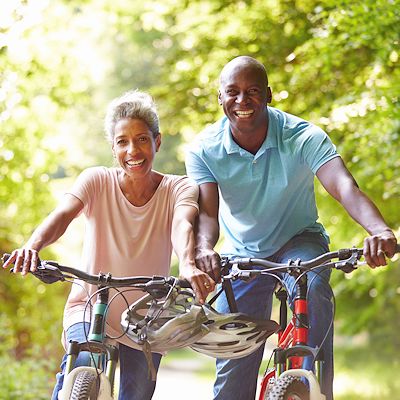You know it’s important to get enough physical activity in your day, but do you know why?
Get Healthy, Live Well encourages people to get at least 30 minutes of exercise five or more times a week. Even if you have to break down your exercise time into 10- or 15-minute increments, you still benefit. So you can take a quick stroll on your lunch break or jog a few quick laps around the parking lot after work to help you toward your 30-a-day goal.
Here are five great reasons to Go for 30:
1. Lose Weight, Feel Great
You know that feeling when you go to put on those pants that are always a little too tight but now they button easily? And so you go on to a pair you haven’t worn in forever and find that those fit, too? That’s what going for 30 can get you.
 Losing weight is as simple as burning more calories than you consume, and exercise is essential to making sure you’re burning enough calories. The more intense the activity, the more calories you burn. But don’t let that dissuade you — the best exercise is always the one you’ll do, so if running isn’t your thing, go for a walk, ride your bike, shoot some hoops with your kids or whatever it is you need to do to get your 30 minutes in. In short order, not only will you feel better, but your self-image will improve, too.
Losing weight is as simple as burning more calories than you consume, and exercise is essential to making sure you’re burning enough calories. The more intense the activity, the more calories you burn. But don’t let that dissuade you — the best exercise is always the one you’ll do, so if running isn’t your thing, go for a walk, ride your bike, shoot some hoops with your kids or whatever it is you need to do to get your 30 minutes in. In short order, not only will you feel better, but your self-image will improve, too.
2. Ward Off — Or Control — Chronic Diseases
What diseases can exercise help you avoid? Well, there’s heart disease, hypertension, diabetes, cancer, orthopedic problems, metabolic syndrome, depression…
The list is pretty extensive, but suffice it to say, exercise is good for you in the long run. Not only does exercise help you control your weight (see above), but it also has been shown to boost high-density lipoprotein, or HDL, which is your “good” cholesterol. It also reduces triglycerides. This helps keep your blood pressure and cardiovascular disease in check, reducing your risk for a heart attack or stroke. Staying active helps you remain strong and flexible, which can help you stay on your feet and avoid serious injuries from falls. Exercise releases endorphins, causing your brain to feel pleasure, which can temper the symptoms of depression. Controlling your weight is essential to controlling or reducing the risk for developing type 2 diabetes.
3. Improve Your Intimacy
Intimacy is a personal, but important, part of many people’s lives. And it gets better when you feel better about yourself and you have more energy to pursue it.
Losing weight makes you feel more confident in your self-image, so you’re less likely to shy away from your partner and perhaps a little more willing to wear a certain outfit or try something new. And regular exercise helps you keep up your energy levels, so when you hit the sack, it’s not necessarily because you’re ready for sleep.
4. Sleep Better
There are a lot of ways exercise can improve your health, but one of the most meaningful is what it does for you when you’re not trying to move at all.
Studies have shown time and again that people who exercise regularly experience a better quality of sleep than those who do not. Not only that, but the weight loss that accompanies exercise can help reduce snoring and result in more comfortable sleep for longer periods.
5. Have Some Fun
Remember when exercise used to be fun? Back before we called it “exercise?”
Exercise doesn’t have to be painful, boring or unpleasant; in fact, it should be fun so that you’ll keep doing it. Find the activity that you like best. Or try something new, like lifting weights or taking an aerobics or Zumba class. This is the chance to unwind and do something for you for a change. You can enjoy the outdoors, spend some time with a friend, explore new parks and trails or join a social activity through a community recreation program, like softball, volleyball or soccer.
Whatever activity you choose, remember your goal is 30 minutes a day, at least five days a week. And if you’re not used to physical activity, check in with your primary care provider first to make sure he or she doesn’t recommend any tests to ensure you’re healthy enough for exercise. Start slow, and work up to doing more. And if you start to get tired of one activity, change things up!
You can learn more about getting active and going for 30 at www.GetHealthyLiveWell.org.